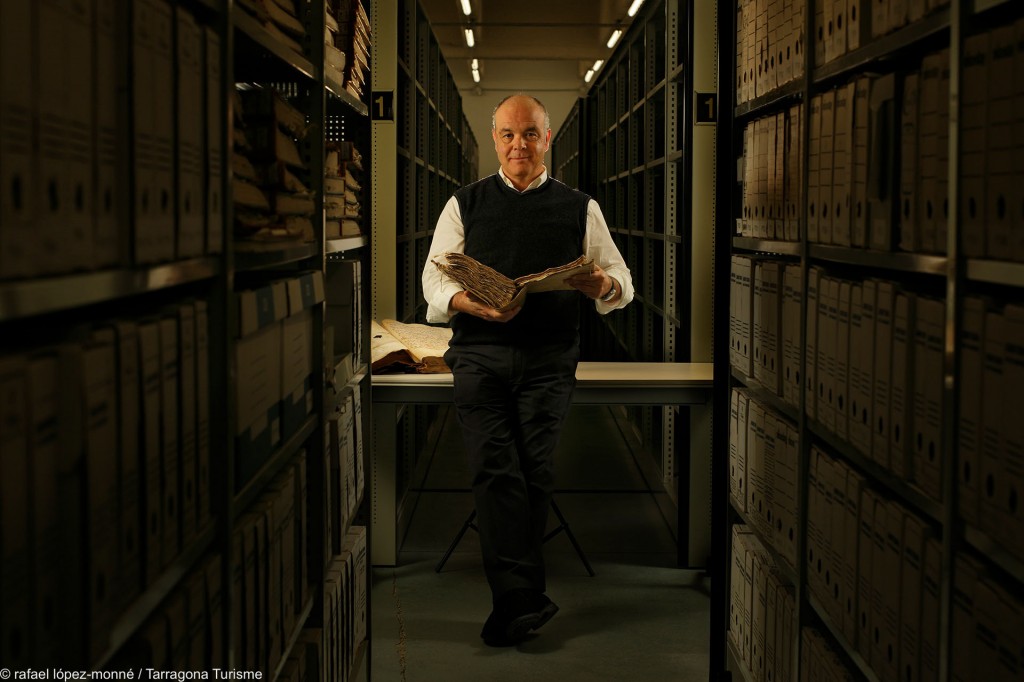While he was distributing ammunition to the barracked soldiers in Lleida, not certain of whom he should invade was he commanded to do so, Jordi Piqué decided, the night of the 23F non-successful coup d’état, he would become a historian once his military service had finished. Not any historian though, but one specialised on in our most recent history, the least known and yet most determinant issues. Born in the Part Alta neighbourhood and Doctor of Contemporary History, Jordi Piqué has been the Tarragona Archives’ director for ten years now, a documentation centre that has managed to break the traditional isolation of knowledge, and which plays an active role in the dissemination of a not always splendorous story, although thousands of names, facts and numbers are being used in order to explain the singularity of Tarragona’s character.
Archives can be an enclosed and prosaic space, a never-ending morgue full of files and folders rotting onto hundreds of metallic shelves. Or rather a space where documents are not just illuminated by some fluorescent tubes, but also by the light of those in charge, actors committed to the spreading of knowledge. “Knowing history unites our society. The Archives is home to Tarragona’s memory, an open door not just to the city’s past, but also to its future”, says Jordi Piqué. These municipal facilities, which watch over in excess of 8.300 metres of documentation from the 18th to the 21st century, have assumed a cultural leading role and circulate the city’s memory by organising, exhibiting or publishing top-notch research items.
A Spanish Civil War commemorative exhibition soon opened to users, or that of the SCAN Festival available these days –a long journey of the Tarragona from the 70s through the lens and professional attrezzo of Ramon Segú Chinchilla, a very prolific retired photojournalist– are just two of the large number of projects being carried out. In the same way as other characters in the city, who have gathered valuable documentation of public domain throughout decades, Chinchilla has signed his photo collection over the Tarragona Archives, “the city’s Archives”, states Jordi Piqué. Of course, the project is way more ambitious than a mere safekeeping of somebody else’s files. The main purpose is for the Archives to become a meeting point for different particular experiences and memories of the greatest possible number of people, creating and hardening the bonds that connect them, as well as bringing back the collective memory with all the existing shades and colours.
This is what the project “Capsa de Sabates” (Shoe box) is all about, a website where citizens can save and share family photo albums, and which has brought the diversity found in Tarragona’s social fabric to the surface. “Tarragona is a welcome city. Only a small minority has all their roots here. Many immigrants who came drawn by the industry and tourism of the sixties used to live in huts, and in recent years we’ve got many more coming from other countries, some of which tell us their stories thanks to the Capsa. Their memories are valuable, they do also form the city and we face the challenge of integrating them”, says Piqué.
There is a before and after the service moved –located in the Town Hall until 2012– to one of the old Tabacalera driers. In the new Part Baixa location, the Archives have gained in storage, enquiry and exhibition area. In fact, they have grown so much that now they manage not just the administrative collection used regularly by the Town Hall and the municipal history archives –improved in the last years with a number of particular donations and one of the best collections of books from 1358–; they now also manage the municipal newspapers and periodicals library of Tarragona, which has around 15.000 books and over 400 publications from the last 200 years, plus the Images Centre, which provides online access to over 35.000 documents out of 1,5 million.
In 2013 alone, the Archives got 3.000 visitors, an absolute no-no only a few years ago; and even more impossible back in the beginning of the dictatorship in Tarragona, when Piqué had just started his Psychology studies. “By organising exhibitions and talks that bring memories back, we’ve achieved to meet visitors that will probably never come back. We have the obligation to push on divulgation, to reach as many people as possible. There is a strong need to get things moving because of the damage Franco regime cause in the country, and we are still feeling the consequences, like cultural underdevelopment or the lack of civic sense. This explains some social phenomena like the popular acceptance of clever clogs and high levels of tax fraud”, he says.
Solving a problem means being aware and admitting it. We must know what we went through in order to know where we are now. In a country that has some doors still very closed, the Tarragona’s Archives and others are trying to open them while placing knowledge at the service of society.
Text: Oriol Margalef (@OhMargalef on Twitter)
Photos: Rafael López-Monné (@lopezmonne on Twitter)
Translation: Artur Santos (@artur_1983)




